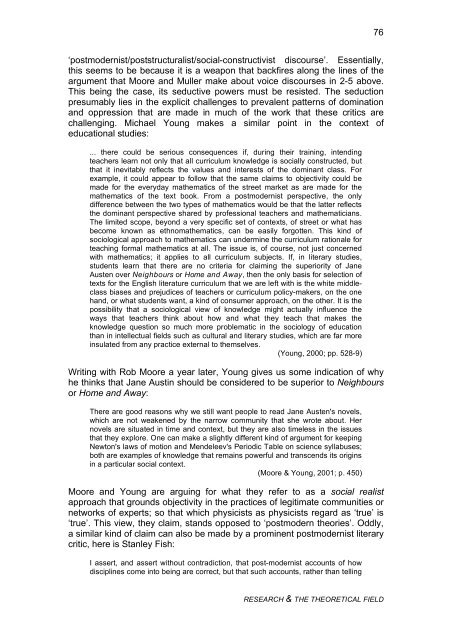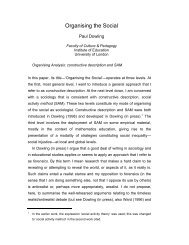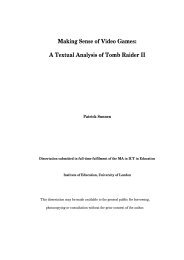Research and the Theoretical Field - Pauldowling.me
Research and the Theoretical Field - Pauldowling.me
Research and the Theoretical Field - Pauldowling.me
You also want an ePaper? Increase the reach of your titles
YUMPU automatically turns print PDFs into web optimized ePapers that Google loves.
76<br />
‘postmodernist/poststructuralist/social-constructivist discourse’. Essentially,<br />
this seems to be because it is a weapon that backfires along <strong>the</strong> lines of <strong>the</strong><br />
argu<strong>me</strong>nt that Moore <strong>and</strong> Muller make about voice discourses in 2-5 above.<br />
This being <strong>the</strong> case, its seductive powers must be resisted. The seduction<br />
presumably lies in <strong>the</strong> explicit challenges to prevalent patterns of domination<br />
<strong>and</strong> oppression that are made in much of <strong>the</strong> work that <strong>the</strong>se critics are<br />
challenging. Michael Young makes a similar point in <strong>the</strong> context of<br />
educational studies:<br />
... <strong>the</strong>re could be serious consequences if, during <strong>the</strong>ir training, intending<br />
teachers learn not only that all curriculum knowledge is socially constructed, but<br />
that it inevitably reflects <strong>the</strong> values <strong>and</strong> interests of <strong>the</strong> dominant class. For<br />
example, it could appear to follow that <strong>the</strong> sa<strong>me</strong> claims to objectivity could be<br />
made for <strong>the</strong> everyday ma<strong>the</strong>matics of <strong>the</strong> street market as are made for <strong>the</strong><br />
ma<strong>the</strong>matics of <strong>the</strong> text book. From a postmodernist perspective, <strong>the</strong> only<br />
difference between <strong>the</strong> two types of ma<strong>the</strong>matics would be that <strong>the</strong> latter reflects<br />
<strong>the</strong> dominant perspective shared by professional teachers <strong>and</strong> ma<strong>the</strong>maticians.<br />
The limited scope, beyond a very specific set of contexts, of street or what has<br />
beco<strong>me</strong> known as ethnoma<strong>the</strong>matics, can be easily forgotten. This kind of<br />
sociological approach to ma<strong>the</strong>matics can undermine <strong>the</strong> curriculum rationale for<br />
teaching formal ma<strong>the</strong>matics at all. The issue is, of course, not just concerned<br />
with ma<strong>the</strong>matics; it applies to all curriculum subjects. If, in literary studies,<br />
students learn that <strong>the</strong>re are no criteria for claiming <strong>the</strong> superiority of Jane<br />
Austen over Neighbours or Ho<strong>me</strong> <strong>and</strong> Away, <strong>the</strong>n <strong>the</strong> only basis for selection of<br />
texts for <strong>the</strong> English literature curriculum that we are left with is <strong>the</strong> white middleclass<br />
biases <strong>and</strong> prejudices of teachers or curriculum policy-makers, on <strong>the</strong> one<br />
h<strong>and</strong>, or what students want, a kind of consu<strong>me</strong>r approach, on <strong>the</strong> o<strong>the</strong>r. It is <strong>the</strong><br />
possibility that a sociological view of knowledge might actually influence <strong>the</strong><br />
ways that teachers think about how <strong>and</strong> what <strong>the</strong>y teach that makes <strong>the</strong><br />
knowledge question so much more problematic in <strong>the</strong> sociology of education<br />
than in intellectual fields such as cultural <strong>and</strong> literary studies, which are far more<br />
insulated from any practice external to <strong>the</strong>mselves.<br />
(Young, 2000; pp. 528-9)<br />
Writing with Rob Moore a year later, Young gives us so<strong>me</strong> indication of why<br />
he thinks that Jane Austin should be considered to be superior to Neighbours<br />
or Ho<strong>me</strong> <strong>and</strong> Away:<br />
There are good reasons why we still want people to read Jane Austen's novels,<br />
which are not weakened by <strong>the</strong> narrow community that she wrote about. Her<br />
novels are situated in ti<strong>me</strong> <strong>and</strong> context, but <strong>the</strong>y are also ti<strong>me</strong>less in <strong>the</strong> issues<br />
that <strong>the</strong>y explore. One can make a slightly different kind of argu<strong>me</strong>nt for keeping<br />
Newton's laws of motion <strong>and</strong> Mendeleev's Periodic Table on science syllabuses;<br />
both are examples of knowledge that remains powerful <strong>and</strong> transcends its origins<br />
in a particular social context.<br />
(Moore & Young, 2001; p. 450)<br />
Moore <strong>and</strong> Young are arguing for what <strong>the</strong>y refer to as a social realist<br />
approach that grounds objectivity in <strong>the</strong> practices of legitimate communities or<br />
networks of experts; so that which physicists as physicists regard as ‘true’ is<br />
‘true’. This view, <strong>the</strong>y claim, st<strong>and</strong>s opposed to ‘postmodern <strong>the</strong>ories’. Oddly,<br />
a similar kind of claim can also be made by a prominent postmodernist literary<br />
critic, here is Stanley Fish:<br />
I assert, <strong>and</strong> assert without contradiction, that post-modernist accounts of how<br />
disciplines co<strong>me</strong> into being are correct, but that such accounts, ra<strong>the</strong>r than telling<br />
RESEARCH & THE THEORETICAL FIELD




